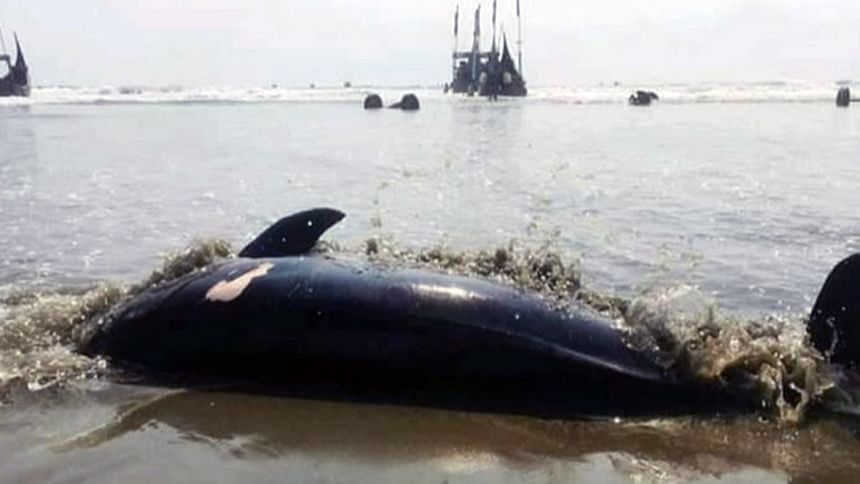Vulnerable porpoise, dolphin found dead in Cox’s Bazar in the span of 2 days

On regular days, you will be hard-pressed to find much biodiversity along the beaches of Cox's Bazar. Even coming across a jellyfish, has resulted in squeals from many a visitor.
So, a sighting of a large marine mammal, albeit dead, is reason for news. That too, two days in a row.
Yesterday, an Indo-Pacific Finless Porpoise, considered globally vulnerable according to the International Union for Conservation of Nature (IUCN), washed ashore at Shamlapur beach in Cox's Bazar's Teknaf upazila.
The porpoise was seen on the beach by a local, Jalal Uddin, of Shamalpur union. The marine mammal was entangled in a fishing net and had bruises all over its body, likely inflicted by some metal object, locals said according to our Chattogram correspondent.
Just a day after the porpoise washed ashore, an Indo-Pacific Humpback Dolphin was found on the beach of Inani in Cox's Bazar.
The mammal was seen tied with a rope, usually used in fishing nets.
The divisional forest officer (DFO) of Cox's Bazar (south), Humayun Kabir, said there were two more such sightings of dead marine mammals on the beach last year.
Marine mammals are especially vulnerable to being entangled in fishing nets. And once entangled, they cannot come up to the surface to breathe, eventually killing them.
Many of the marine megafauna are also affected by the growing sea traffic. The injury marks on the porpoise is likely from the propeller of a ship, experts have opined.
Internationally, animal welfare activists have said that tightly meshed fishing nets are usually responsible for such deaths.
In Bangladesh too, conservationists believe the same.
"It is possible the porpoise was entangled in a fishing net. Bycatch is one of the biggest threats to cetacean worldwide and our country is no exception," said Shamsunnahar Shanta, program coordinator of the Marine Protected Area program at Wildlife Conservation Society - Bangladesh Program (WCS-BD).
However, there is reason to hold out hope, as Bangladesh has made strides in conservation of coastal areas such as declaration of the Marine Protected Area in Nijhum Dwip, a key habitat for both porpoise and dolphin. Work continues on all fronts, but most of all, what is needed is sensitisation of all stakeholders across the board so they come together for protecting marine biodiversity.

 For all latest news, follow The Daily Star's Google News channel.
For all latest news, follow The Daily Star's Google News channel. 



Comments